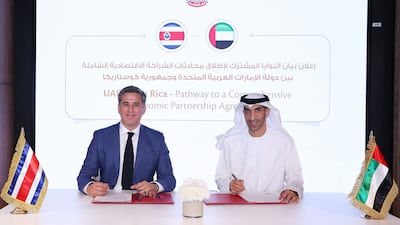The UAE and Costa Rica have started Comprehensive Economic Partnership Agreement negotiations to strengthen their trade ties.
The move comes as the Arab world’s second-largest economy forges ahead to develop closer trade and investment relations with partners around the world.
The UAE has already signed four Cepa deals with India, Israel, Indonesia and Turkey, and is close to finalising new agreements with Cambodia and Kenya. It also recently concluded negotiations for a new trade deal with Georgia.
“Today, through the launch of preliminary Cepa negotiations, we have laid the foundations for building a significant and influential platform to future-proof UAE-Costa Rica economic and trade relations,” Dr Thani Al Zeyoudi, Minister of State for Foreign Trade, said on Tuesday.
“This agreement will contribute to establishing a new era of investment and trade in various fields, thereby supporting the sustainable economic development of both our nations and benefiting regional and global economies.”
The UAE and Costa Rica have strong trade and investment ties.
Non-oil trade between the Emirates and Costa Rica grew by 19 per cent annually to Dh216 million ($58.7 million) in 2022.
The Emirates is also investing in Costa Rica in sectors such as IT, tourism, retail, advertising, media, real estate, renewable energy, air transport and logistics to strengthen its presence in the Central American nation.
Dr Al Zeyoudi said the UAE would continue its efforts to build partnerships with strategic global markets under the country’s comprehensive economic partnerships programme.
This is in line with the ‘We the UAE vision 2031’ that aims to double the size of its economy from Dh1.49 trillion to Dh3 trillion, increase national non-oil exports to Dh800 billion, and raise the value of the UAE’s foreign trade to Dh4 trillion by 2031.
Last year, the UAE's non-oil foreign trade surged 17 per cent annually to a record Dh2.23 trillion. This was the first time the country's non-oil foreign trade crossed the Dh2 trillion mark.
“The establishment of a Cepa with the UAE will be the beginning of a new era of mutually beneficial relations,” said Manuel Rivera, Costa Rica's Minister of Foreign Trade.
“This will be our first free trade agreement with a country in the Middle East, and Costa Rica will continue to rise in prominence as a key Latin American partner to the UAE.”
The UAE is working towards signing 26 comprehensive economic partnership agreements as it seeks to attract more investment and diversify its economy, UAE Minister of Economy Abdulla bin Touq said this month.
It is looking to eliminate or reduce tariffs, remove unnecessary trade barriers, increase market access and set up investment and trade joint-ventures with its partners.
On April 1, the UAE's Cepa deal with Israel will come into effect, Dr Al Zeyoudi said in a LinkedIn post on Tuesday.
Earlier this month, the UAE signed a Cepa with Turkey to boost trade between the two nations.
The agreement, which is expected to come into effect from the middle of this year, will create 25,000 highly skilled jobs in the UAE and 100,000 jobs in the Turkish market in the next 10 years.
Bilateral non-oil trade is expected to surge to more than $40 billion in the next five years from about $18.9 billion currently, Dr Al Zeyoudi told The National at the time.


